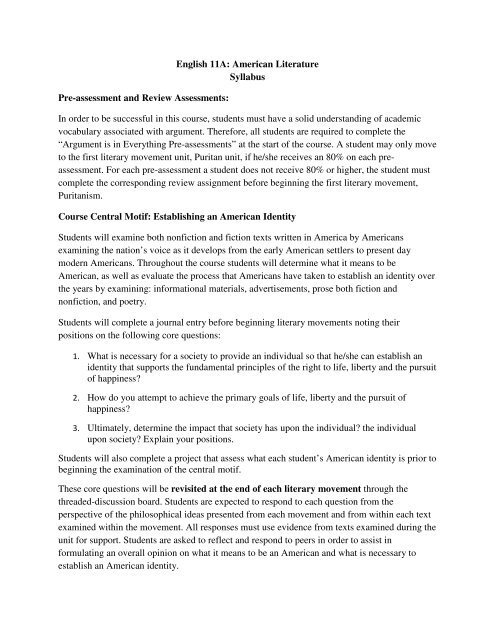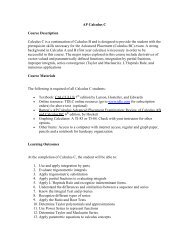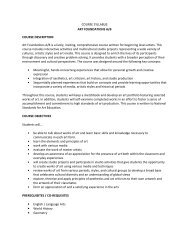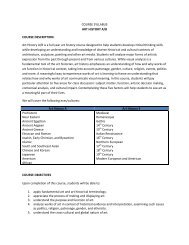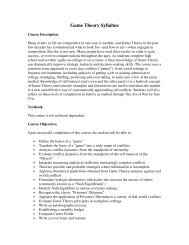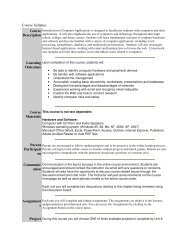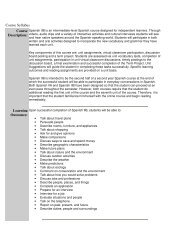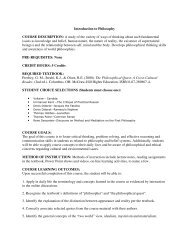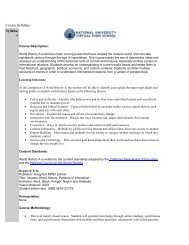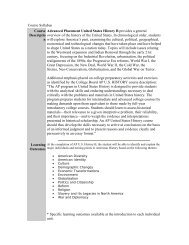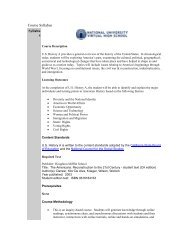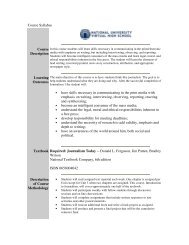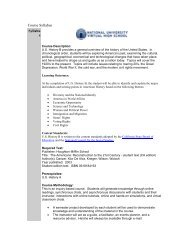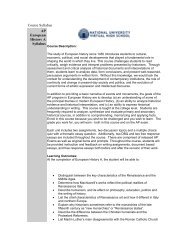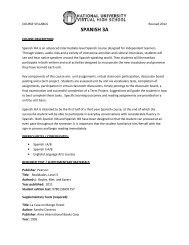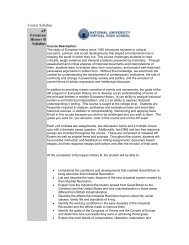English 11A: American Literature Syllabus Pre-assessment and ...
English 11A: American Literature Syllabus Pre-assessment and ...
English 11A: American Literature Syllabus Pre-assessment and ...
You also want an ePaper? Increase the reach of your titles
YUMPU automatically turns print PDFs into web optimized ePapers that Google loves.
<strong>Pre</strong>-<strong>assessment</strong> <strong>and</strong> Review Assessments:<br />
<strong>English</strong> <strong>11A</strong>: <strong>American</strong> <strong>Literature</strong><br />
<strong>Syllabus</strong><br />
In order to be successful in this course, students must have a solid underst<strong>and</strong>ing of academic<br />
vocabulary associated with argument. Therefore, all students are required to complete the<br />
“Argument is in Everything <strong>Pre</strong>-<strong>assessment</strong>s” at the start of the course. A student may only move<br />
to the first literary movement unit, Puritan unit, if he/she receives an 80% on each pre<strong>assessment</strong>.<br />
For each pre-<strong>assessment</strong> a student does not receive 80% or higher, the student must<br />
complete the corresponding review assignment before beginning the first literary movement,<br />
Puritanism.<br />
Course Central Motif: Establishing an <strong>American</strong> Identity<br />
Students will examine both nonfiction <strong>and</strong> fiction texts written in America by <strong>American</strong>s<br />
examining the nation’s voice as it develops from the early <strong>American</strong> settlers to present day<br />
modern <strong>American</strong>s. Throughout the course students will determine what it means to be<br />
<strong>American</strong>, as well as evaluate the process that <strong>American</strong>s have taken to establish an identity over<br />
the years by examining: informational materials, advertisements, prose both fiction <strong>and</strong><br />
nonfiction, <strong>and</strong> poetry.<br />
Students will complete a journal entry before beginning literary movements noting their<br />
positions on the following core questions:<br />
1. What is necessary for a society to provide an individual so that he/she can establish an<br />
identity that supports the fundamental principles of the right to life, liberty <strong>and</strong> the pursuit<br />
of happiness?<br />
2. How do you attempt to achieve the primary goals of life, liberty <strong>and</strong> the pursuit of<br />
happiness?<br />
3. Ultimately, determine the impact that society has upon the individual? the individual<br />
upon society? Explain your positions.<br />
Students will also complete a project that assess what each student’s <strong>American</strong> identity is prior to<br />
beginning the examination of the central motif.<br />
These core questions will be revisited at the end of each literary movement through the<br />
threaded-discussion board. Students are expected to respond to each question from the<br />
perspective of the philosophical ideas presented from each movement <strong>and</strong> from within each text<br />
examined within the movement. All responses must use evidence from texts examined during the<br />
unit for support. Students are asked to reflect <strong>and</strong> respond to peers in order to assist in<br />
formulating an overall opinion on what it means to be an <strong>American</strong> <strong>and</strong> what is necessary to<br />
establish an <strong>American</strong> identity.
Course Project:<br />
At the end of the course, students will complete an argument paper where they: write a 3-5 page<br />
analysis paper that addresses what it means to be an <strong>American</strong> using support from both fictional<br />
<strong>and</strong> informational texts read over the course of the semester to support assertion. Students will<br />
use previous reflections to assist in composition using proper MLA format.<br />
Literary Movements <strong>and</strong> Novel Study:<br />
Students will examine the following literary movements in America:<br />
• Puritanism<br />
• Rationalism: The Age of Reason<br />
• <strong>American</strong> Romanticism <strong>and</strong> Transcendentalism<br />
Novel study: (Play)<br />
• Inherit the Wind by Jerome Lawrence <strong>and</strong> Robert E. Lee<br />
Each literary movement <strong>and</strong> the novel study will require students to refine his/her skills in<br />
reading, writing, listening <strong>and</strong> speaking. All units require students to use secondary sources to<br />
identify <strong>and</strong> examine the philosophical beliefs of <strong>American</strong>s during a particular literary<br />
movement or the novel study. Students will then analyze key fiction <strong>and</strong> nonfiction texts from<br />
the period in order to master common core st<strong>and</strong>ards. Each literary movement, as well as the<br />
novel study will require literary analysis <strong>and</strong> writing in order provide practice for students to<br />
master common core st<strong>and</strong>ards.<br />
Students will receive feedback from teacher on submitted general assignments within 4 days of<br />
submittal. Students are encouraged to use the “Questions Discussion Board” to post questions<br />
about all assignments in order to get help from both the teacher <strong>and</strong> other students before turning<br />
in assignments.<br />
General Assessments: Each text within a unit has at least one general <strong>assessment</strong> for students to<br />
work with common core st<strong>and</strong>ards. St<strong>and</strong>ards reappear in each unit. General <strong>assessment</strong>s are<br />
worth 20% of total grade. These <strong>assessment</strong>s are where students become comfortable with<br />
st<strong>and</strong>ards. (Assessment types: Cornell Notes, graphic organizers to help with text analysis,<br />
graphic organizers to review key common core st<strong>and</strong>ards.)<br />
Tests, Unit Projects <strong>and</strong> Essays: These assignments are worth 45% of total grade because<br />
they assess a student’s mastery of ongoing common core st<strong>and</strong>ards as well as underst<strong>and</strong>ing of a<br />
particular literary movement. Teacher will post scores to summative <strong>assessment</strong>s within 2 weeks<br />
of student submission of assignment.
• Essays: Writing is a process that takes time to refine. Therefore, teachers will use both<br />
formative <strong>and</strong> summative rubrics to assess writing. Formative writing rubrics will be used<br />
for initial writing assignments in the Puritan <strong>and</strong> Rationalist units. The <strong>American</strong><br />
Romanticism <strong>and</strong> Transcendentalism unit, Novel exploration <strong>and</strong> Course project will use<br />
summative <strong>assessment</strong> rubrics. Note: Some tests will have timed essay. Unless it is noted<br />
in the test itself, timed essays will use the summative essay rubric. Some teachers may<br />
require students to rewrite formative essays for summative essay grades. *See rubrics for<br />
specifics.<br />
Course Project <strong>and</strong> Final Exam: The course project is a culminating paper where students will<br />
demonstrate mastery of all common core st<strong>and</strong>ards covered over the semester, as well as<br />
underst<strong>and</strong>ing of course central motif <strong>and</strong> how each literary movement contributes to the course<br />
motif. The final exam covers student mastery of all common core st<strong>and</strong>ards covered over the<br />
semester. Therefore, these <strong>assessment</strong> are worth 35% of total grade.<br />
Course Expectations:<br />
• Students will spend a minimum of 10 hours per week working on course work.<br />
• Students will contact teacher either through the course “Questions Discussion Board” or<br />
via e-mail with all content questions/concerns prior to turning in <strong>assessment</strong>s.<br />
• Students are responsible for reading course “Bulletin Board” for teacher clarification<br />
<strong>and</strong>/or additional tasks for <strong>assessment</strong>s.<br />
• Students must follow proper MLA guidelines <strong>and</strong> rules of grammar with all responses.<br />
Since this is an online course, where many responses are posted for other students to see,<br />
students need to treat each <strong>assessment</strong> as a formal academic <strong>assessment</strong>. This means that<br />
proofreading is important before posting/submitting assignments.<br />
• Students will participate in course with academic integrity. Plagiarism is when a student<br />
copies, lifts, steals another individual’s ideas or work either intentionally or<br />
unintentionally <strong>and</strong> passes it off as his or her own. This means that students must use<br />
proper in text citations when paraphrasing <strong>and</strong> using quotations. See MLA link on course<br />
home page for additional guidance to avoid plagiarism. Note: All essays are submitted<br />
through turnitin.com, a tool to catch plagiarism.<br />
Course Outline<br />
Unit<br />
Unit 1:<br />
Argument is in Everything<br />
Activities<br />
• Introduction<br />
• Argument <strong>and</strong> Academic Vocabulary<br />
<strong>Pre</strong>-Assessment<br />
• Rhetorical Appeals <strong>Pre</strong>-Assessment
• Rhetorical Devices <strong>Pre</strong>-Assessment<br />
• Discussion<br />
Unit 2:<br />
Review of Academic Vocabulary, Rhetorical<br />
Appeals <strong>and</strong> Rhetorical Devices<br />
Unit 3:<br />
Establishing an <strong>American</strong> Identity<br />
Unit 4:<br />
Puritanism<br />
• Introduction<br />
• Notes on Argument <strong>and</strong> Academic<br />
Vocabulary <strong>and</strong> Reflection<br />
• Review of Academic Vocabulary<br />
• Read “The Pleasure of Books” by<br />
William Lyon Phelps<br />
• Complete the paraphrase activity<br />
• Rhetorical Appeals reflection<br />
• Rhetorical Appeals Activity<br />
• Rhetorical Appeals Review <strong>and</strong> Analysis<br />
• Read “Democratic <strong>Pre</strong>sidential<br />
C<strong>and</strong>idate Acceptance Speech” by<br />
Barack Obama (2008)<br />
• Read “I Have a Dream” by Dr. Martin<br />
Luther King, Jr.<br />
• Review Rhetorical Device Vocabulary<br />
Words with Examples <strong>and</strong> Analysis<br />
• Complete the Rhetorical Device<br />
Activity<br />
• Discussion<br />
• Introduction<br />
• Journal Reflection<br />
• Discussion<br />
• What is <strong>American</strong> Identity? Activity<br />
• Introduction<br />
• Puritan Ideologies Activity<br />
• Informational Pamphlet Activity<br />
• Read “Sinners in the H<strong>and</strong>s of an Angry<br />
God” by Jonathan Edwards<br />
• Complete the Sinners in the H<strong>and</strong>s of<br />
an Angry God Activity<br />
• Complete the Sinners in the H<strong>and</strong>s of<br />
an Angry God Rhetorical Devices<br />
Activity<br />
• Complete the Sinners in the H<strong>and</strong>s of<br />
an Angry God Writing Activity<br />
• Complete the Sinners in the H<strong>and</strong>s of<br />
an Angry God Quiz<br />
• Complete the Evaluating Writing<br />
Activity<br />
• Complete the Reflection
Unit 5:<br />
Rationalism: The Age of Reason<br />
Midterm<br />
Unit 6:<br />
<strong>American</strong> Romanticism <strong>and</strong><br />
Transcendentalism<br />
Unit 7:<br />
Novel Exploration<br />
• Read “Self Acquaintance”<br />
• Complete the Self Acquaintance<br />
Activities<br />
• Summarize Puritan Ideologies<br />
• Complete the reflection<br />
• View the Self Acquaintance Video<br />
• Complete the Course Motif Reflection<br />
• Introduction<br />
• Complete the Using Secondary<br />
Resources Activity: Rationalism<br />
• View the Age of Reason Video<br />
• View the Letter to John Adams<br />
• Read the “Letter to John Adams”<br />
• Complete the Abigail Adams Activity<br />
• Complete the Writing Evaluation<br />
Activity <strong>and</strong> Reflection<br />
• Complete the Letter to John Adams<br />
Quiz<br />
• Read “Speech to the Virginia<br />
Convention” by Patrick Henry<br />
• Complete the Speech to the Virginia<br />
Convention Activity<br />
• Complete the Explicit <strong>and</strong> Implied Tone<br />
Activity<br />
• Complete the Speech to the Virginia<br />
Convention Quiz<br />
• Complete the Course Motif Reflection<br />
Midterm Assessment<br />
• Introduction<br />
• Complete the What is <strong>American</strong><br />
Romanticism <strong>and</strong> Transcendentalism<br />
Activity<br />
• Read “Song of Myself. 52” by Walt<br />
Whitman<br />
• Complete the Song of Myself Activity<br />
• View the Devil <strong>and</strong> Tom Walker Video<br />
• Complete the Devil <strong>and</strong> Tom Walker<br />
Activity<br />
• Complete the Dark Romantic<br />
Ideologies Activity<br />
• Complete the Key Motifs in <strong>American</strong><br />
Romantic <strong>Literature</strong> Activity<br />
• Complete the Course Motif Reflection<br />
• Read Inherit the Wind by Jerome<br />
Lawrence <strong>and</strong> Robert E. Lee
• Complete the Cornell Notes Activity<br />
• Complete the Before Reading Activity<br />
• Complete the Literary Response <strong>and</strong><br />
Analysis Activity<br />
• Complete the Act I Discussion<br />
• Complete the Act II Discussion<br />
• Complete the Act III Discussion<br />
• Complete the Inherit the Wind Project<br />
• Complete the Course Motif Reflection<br />
Unit 8:<br />
Course Project<br />
• Complete the Course Project on<br />
<strong>American</strong> Identity<br />
Final Exam • Complete the Final Exam


